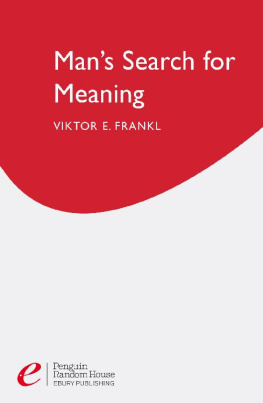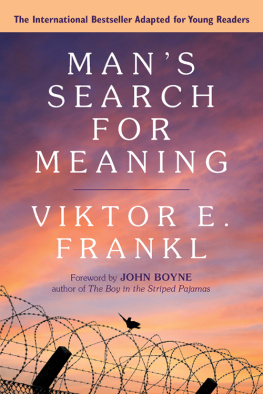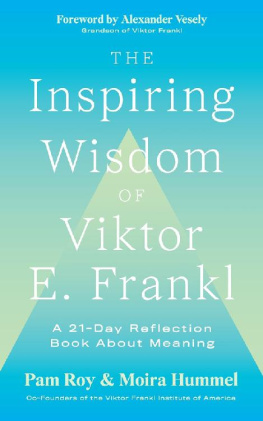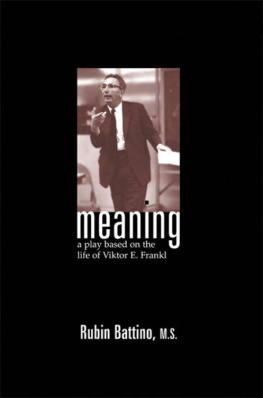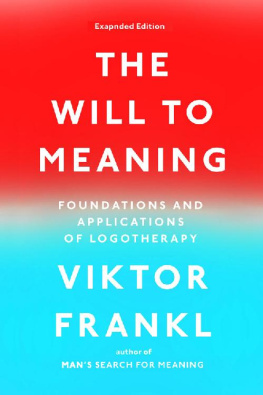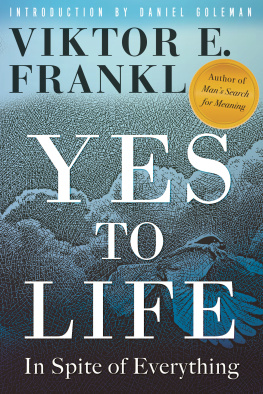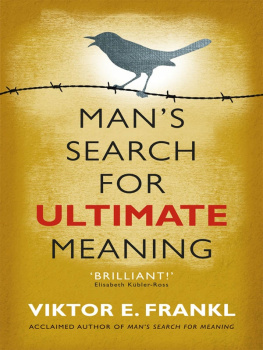Contents
About the Book
A prominent Viennese psychiatrist before the war, Viktor Frankl was uniquely able to observe the way that both he and others in Auschwitz coped (or didnt) with the experience. He noticed that it was the men who comforted others and who gave away their last piece of bread who survived the longest and who offered proof that everything can be taken away from us except the ability to choose our attitude in any given set of circumstances. The sort of person the concentration camp prisoner became was the result of an inner decision and not of camp influences alone. Frankl came to believe mans deepest desire is to search for meaning and purpose. This outstanding work offers us all a way to transcend suffering and find significance in the art of living.
About the Author
Viktor E. Frankl was Professor of Neurology and Psychiatry at the University of Vienna Medical School. He was the founder of what has come to be called the Third Viennese school of Psychotherapy (after Freuds psychoanalysis and Adlers individual psychology) the school of logotherapy. His writings have been called the most important contributions in the field of Psychotherapy since the days of Freud, Adler and Jung by Sir Cyril Burt, ex-President of the British Psychological Society.
Born in 1905, Dr. Frankl received the degrees of Doctor of Medicine and Doctor of Philosophy from the University of Vienna. During World War II he spent three at Auschwitz, Dachau, and other concentration camps.
Dr. Frankl first published in 1924 in the International Journal of Psychoanalysis and published thirty books in all, which have been translated into twenty-three languages, including Japanese and Chinese. He was a visiting professor at Harvard, as well as at universities in Pittsburgh, San Diego and Dallas. Honorary doctoral degrees were conferred upon him by twenty-nine universities and he was a guest lecturer at universities throughout the world. He died in 1997.
Institutes of Logotherapy can now be found on all five continents.
For further information on Viktor Frankl and Logotherapy, including an extensive bibliography, please refer to the website of the Viktor Frankl Institute, Vienna at www.viktorfrankl.org.
Praise for
Mans Search for Meaning
Influential and eloquent Jewish Chronicle
The views which Dr. Frankl puts forward in his writings represent the most important contributions in the field of Psychotherapy since the days of Freud, Adler and Jung. His style is far more readable.
Sir Cyril Burt, ex-President of the British Psychological Society
Viktor Frankls timeless formula for survival. One of the classic psychiatric texts of our time, Mans Search for Meaning is a meditation on the irreducible gift of ones own counsel in the face of great suffering, as well as a reminder of the responsibility each of us owes in valuing the community of our humanity. There are few wiser, kinder, or more comforting challenges than Frankls.
Patricia J. Williams, author of Seeing a Color-Blind Future: The Paradox of Race
This is one of the most remarkable books I have ever read. It changed my life and became a part of all that I live and all that I teach. It truly is a must-read book.
Susan Jeffers, author of Feel the Fear and Do It Anyway
Dr. Frankls words have a profoundly honest ring, for they rest on experiences too deep for deception... A gem of a dramatic narrative, focused upon the deepest of human problems.
Professor Gordon W. Allport, author of The Nature of Prejudice
[ Mans Search for Meaning ] might well be prescribed for everyone who would understand our time.
Journal of Individual Psychology
An inspiring document of an amazing man who was able to garner some good from an experience so abysmally bad... Highly recommended.
Library Journal
Mans Search for Meaning
The Classic Tribute to Hope
from the Holocaust
Viktor E. Frankl
Part One Translated by Ilse Lasch
Preface by Harold S. Kushner
TO THE MEMORY OF MY MOTHER
Preface
Viktor Frankls Mans Search for Meaning is one of the great books of our time. Typically, if a book has one passage, one idea with the power to change a persons life, that alone justifies reading and re-reading it and finding room for it on ones shelves. This book has several such passages.
It is first of all a book about survival. Like so many German and East European Jews who thought themselves secure, Frankl was cast into the Nazi network of concentration and extermination camps. Miraculously, he survived, in the biblical phrase a brand plucked from the fire. But his account in this book is less about his travails, what he suffered and lost, than it is about the sources of his strength to survive. Several times in the course of the book, Frankl approvingly quotes the words of Nietzsche, He who has a Why to live for can bear almost any How. He describes poignantly the prisoners who gave up on life, who had lost all hope for a future and were inevitably the first to die. They died less from lack of food or lack of medicine than from lack of hope, lack of something to live for. By contrast, Frankl kept himself alive and kept hope alive by summoning up thoughts of his wife and the prospect of seeing her again after the war, and dreaming at one point of lecturing after the war about the psychological lessons to be learned from the Auschwitz experience. Clearly many prisoners who desperately wanted to live did die, some of disease, some in the crematoria. But Frankls concern is less with the question of why most died than it is with the question of why anyone at all survived.
His experience in Auschwitz, terrible as it was, reinforced what was already one of his key ideas. Life is not primarily a quest for pleasure, as Freud believed, or a quest for power, as Alfred Adler taught, but a quest for meaning. The great task for any person is to find meaning in his or her life. Frankl saw three possible sources for meaning: in work (doing something significant), in love (caring for another person, as Frankl held on to the image of his wife through the darkest days in Auschwitz), and in courage in difficult times. Suffering in and of itself is meaningless; we give our suffering meaning by the way in which we respond to it. At one point, he writes that a person may remain brave, dignified and unselfish, or in the bitter fight for self-preservation he may forget his human dignity and become no more than an animal. He concedes that only a few prisoners of the Nazis were able to do the former, but even one such example is sufficient proof that mans inner strength may raise him above his outward fate.
Finally, Frankls most enduring insight, one that I have called on often in my own life and in countless counseling situations: forces beyond your control can take away everything you possess except one thing, your freedom to choose how you will respond to the situation. You cannot control what happens to you in life, but you can always control what you will feel and do about what happens to you.
There is a scene in Arthur Millers play Incident at Vichy in which an upper-middle-class professional man appears before the Nazi authority that has occupied his town and shows his credentials: his university degrees, his letters of reference from prominent citizens, and so on. The Nazi asks him, Is that everything you have? The man nods yes. The Nazi then throws it all in the wastebasket and tells him, Good, now you have nothing. The man, whose self-esteem had always depended on the respect of others, is emotionally destroyed. Frankl would have argued that we are never left with nothing as long as we retain the freedom to choose how we will respond.



